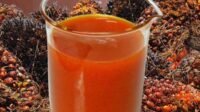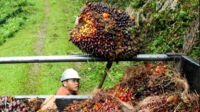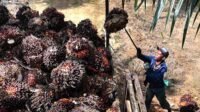PALMOILMAGAZINE, JAMBI – The Jambi Women’s Correctional Facility (Class IIB) has introduced a training program teaching 30 inmates how to produce pempek vinegar using palm sugar. The initiative is part of the prison’s self-reliance development program, designed to equip inmates with practical, income-generating skills.
The training, held in the prison’s vocational hall, featured instructors from Rumah Kreatif Nekno, a local MSME known for its expertise in developing traditional food products.
According to Jambi Women’s Prison Head, Meita Eriza, the program goes beyond skill-building—it is a concrete step in empowering inmates for reintegration into society.
Also Read: Unilever Turns Palm Oil Waste into Clean Energy, Driving Sustainable Downstream Development
“Our hope is that inmates not only serve their sentences but also gain opportunities to learn and grow. Palm sugar–based pempek vinegar has strong potential as a future MSME product they can pursue,” Meita told Palmoilmagazine.com, Saturday (Aug 23, 2025).
Palm sugar was chosen as the main ingredient because it is affordable, widely available, eco-friendly, and produces vinegar with a distinctive taste.
Iriana, Chair of Rumah Kreatif Nekno, emphasized that this skill could open doors to promising small-scale businesses.
“The ingredients are easy to source, the process is simple, and the result has a unique flavor. By using local palm sugar, we’re also supporting regional products. Hopefully, this knowledge will provide inmates with an economic foothold once they return to society,” she said.
During the workshop, participants learned hands-on techniques ranging from ingredient selection and boiling to fermentation and hygienic packaging. Enthusiasm was evident as inmates actively engaged throughout the session.
The prison administration expressed hopes that similar programs will continue, with more community partners involved, so that the skills acquired can truly create new business opportunities for inmates in the future. (P2)





































